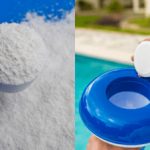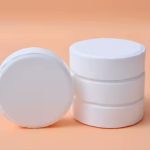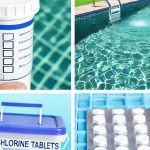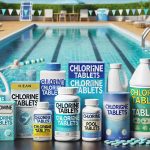When it comes to maintaining a clean and healthy swimming pool, chlorine tablets are a popular and effective solution. They are easy to use, long-lasting, and provide consistent levels of chlorine to keep pool water safe from bacteria and algae. Choosing the correct size of chlorine tablets for pool floaters is essential, as this will determine the efficiency of your pool’s chlorination process. In this article, we’ll cover how to pick the right tablet size for your floater, explain the benefits of various sizes, and compare them with alternatives like liquid chlorine.
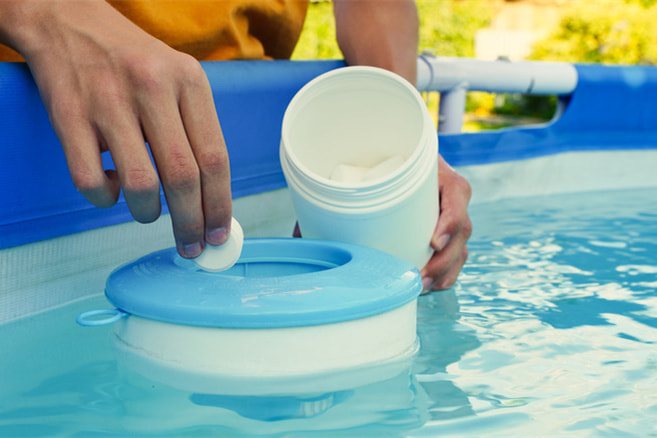
Why Chlorine Tablets are Popular for Pool Sanitization
Swimming pools require a regular dose of chlorine to kill harmful bacteria and maintain water clarity. Tablets are an especially convenient option because they dissolve slowly, releasing chlorine steadily over time. Pool floaters allow these tablets to distribute chlorine evenly throughout the pool without requiring much oversight. This makes them an ideal choice for pool owners who want minimal maintenance.
Chlorine tablets come in different sizes, typically 1-inch and 3-inch varieties. The size you choose will depend on factors like the volume of your pool, the floater’s capacity, and how frequently you maintain your pool. However, not all floaters work effectively with all tablet sizes, so it’s important to choose a size that’s compatible with your floater to ensure optimal performance.
Understanding Chlorine Tablet Sizes: 1-Inch vs. 3-Inch Tablets
The two most common sizes of chlorine tablets are 1-inch and 3-inch varieties. While both provide chlorine to the pool, they have distinct differences in how they dissolve and how often they need to be replaced.
1.1-Inch Chlorine Tablets:
These smaller tablets are ideal for pools with lower water volumes or spas and hot tubs. Because they dissolve faster than 3-inch tablets, they require more frequent replacement. If you have a small pool or use a smaller floater, 1-inch tablets might be more suitable, as they won’t overwhelm the floater with excess chlorine.
2.3-Inch Chlorine Tablets:
For larger pools, 3 inch chlorine tablets are generally the best choice. These larger tablets dissolve more slowly, allowing them to provide a steady supply of chlorine for longer periods. They are highly effective in large floaters and typically require fewer replacements, saving you time and effort in maintaining your pool’s chlorine levels. 3 inch chlorine tablets are a cost-effective solution for pools with over 5,000 gallons of water.
Choosing the Right Tablet Size for Your Pool Floater
When selecting the best size for your chlorine tablets, consider the size and capacity of your pool floater. Floaters are designed to hold a specific number of tablets, so choosing the correct size is essential to avoid over-chlorination or under-chlorination. Using tablets that are too large for the floater can clog it, while tablets that are too small may dissolve too quickly, leading to uneven chlorine distribution.
For standard-sized pools (5,000 gallons and above), a floater with a capacity for 3 inch chlorine tablets is usually recommended. This type of floater will efficiently dissolve the tablet over several days, keeping chlorine levels consistent without requiring constant replacement. If you’re unsure, check the manufacturer’s guidelines for your floater to see which tablet size is compatible.
Chlorine Tablets vs. Liquid Chlorine
While chlorine tablets are the preferred choice for many pool owners, liquid chlorine is another popular form of chlorine sanitization. Both have their own advantages and work differently in the pool. Here’s a quick comparison to help you understand when to use each one.
1.Chlorine Tablets:
Chlorine tablets are designed for slow release, making them ideal for consistent chlorination. They dissolve gradually, allowing for long-lasting effectiveness. They’re also easier to store and handle than liquid chlorine. When used in floaters, tablets offer a “set it and forget it” option, requiring only occasional refilling depending on your pool’s needs.
2.Liquid Chlorine:
Unlike tablets, liquid chlorine disperses rapidly and raises chlorine levels quickly. This makes it useful for shock treatments or for rapidly raising chlorine levels when they’ve dropped too low. However, liquid chlorine needs to be added manually and frequently, as it doesn’t have the same sustained release effect that tablets offer. It also needs to be stored carefully and handled with caution due to its potency.
In general, chlorine tablets are more user-friendly for routine sanitization, while liquid chlorine can be used as a complementary option for rapid chlorination needs or specific situations like pool openings or after heavy use.
Tips for Proper Chlorine Tablet Usage
To get the most out of your chlorine tablets and keep your pool water safe and clean, follow these tips:
1.Monitor Chlorine Levels:
Even though tablets release chlorine gradually, it’s still essential to check your pool’s chlorine levels regularly. Aim to keep chlorine levels between 1 and 3 parts per million (ppm) for optimal sanitation.
2.Use a Pool Cover:
Chlorine can dissipate quickly in sunlight, so using a pool cover can help preserve its levels, especially during peak summer months.
3.Adjust Floater Settings:
Many pool floaters come with adjustable settings to control how quickly the tablet dissolves. Adjust these settings based on your pool’s chlorine requirements and the tablet size to prevent over-chlorination.
1.Shock Your Pool Periodically:
In addition to using tablets, shock your pool with liquid chlorine once a month to remove any residual contaminants that might not be affected by regular chlorination. Shocking helps maintain water quality and prevent the buildup of bacteria and algae.
5.Store Chlorine Tablets Properly:
Keep your tablets in a cool, dry place, away from direct sunlight and moisture. Proper storage ensures that your chlorine tablets remain effective over time and reduces the risk of chemical reactions.
Conclusion
Using chlorine tablets in pool floaters is a simple yet effective way to maintain the cleanliness of your swimming pool. Choosing the right size, whether it’s 1-inch tablets for smaller pools or 3 inch chlorine tablets for larger ones, can greatly impact the efficiency of your pool’s sanitation system. While chlorine tablets are convenient for routine chlorination, liquid chlorine can be a valuable addition to your maintenance routine, especially for shock treatments or immediate sanitization needs.

